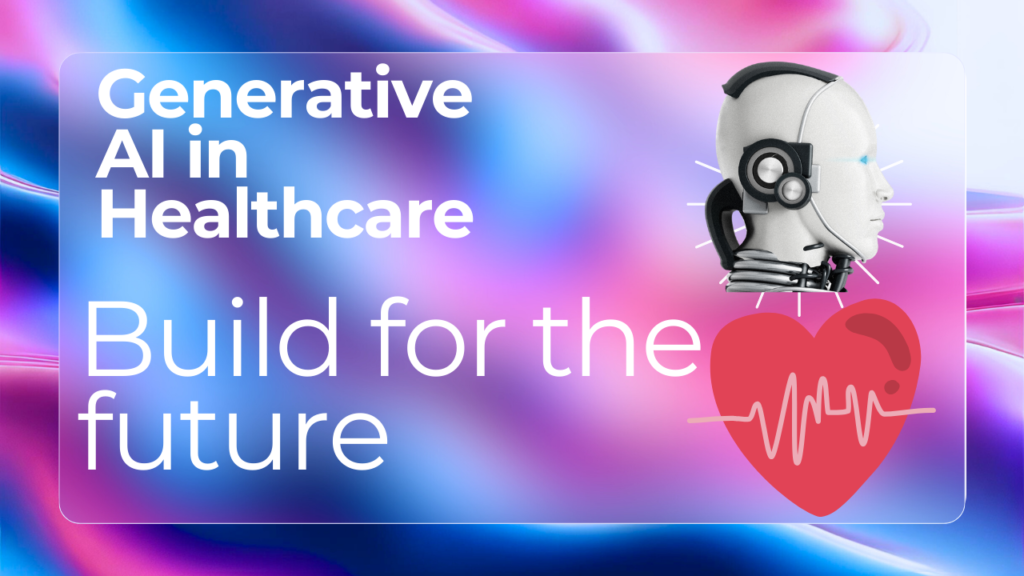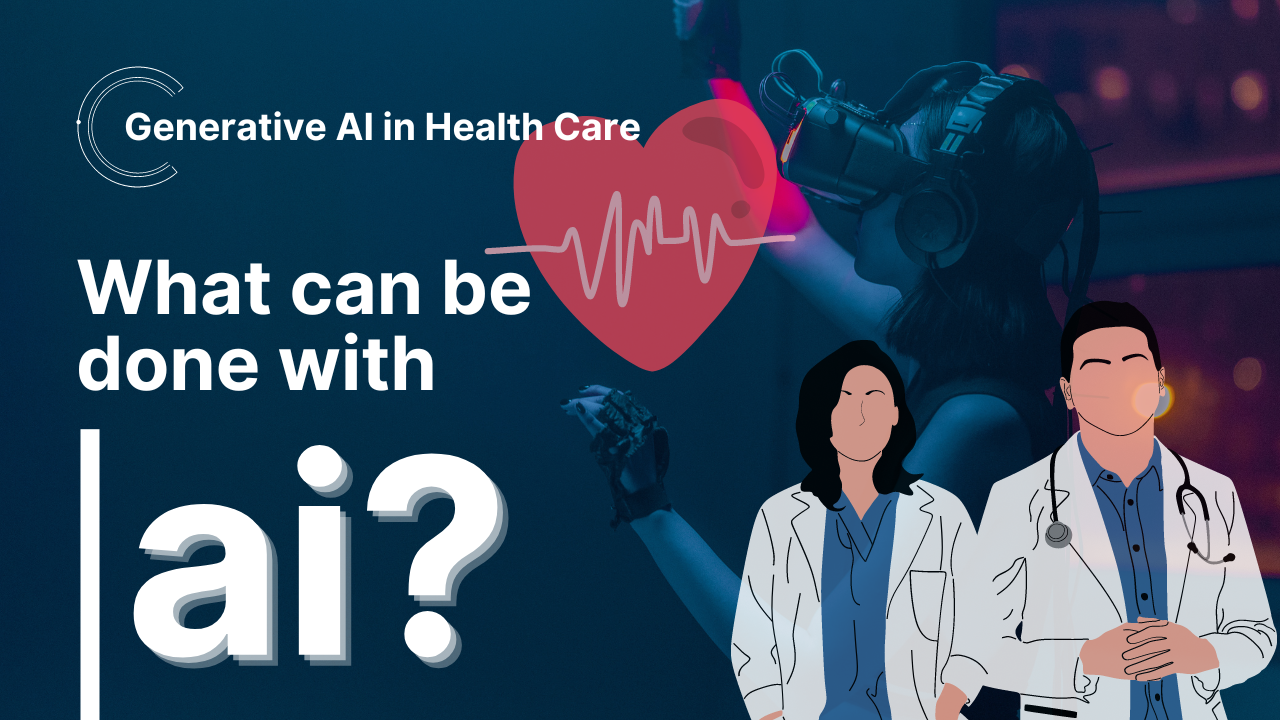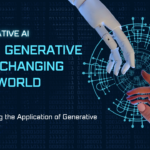Introduction to Applications of Generative AI in Healthcare
In recent years, the integration of Artificial Intelligence (AI) in healthcare has revolutionized the industry, offering innovative solutions to long-standing challenges. Generative AI, a subset of Artificial Intelligence, holds tremendous potential in transforming various aspects of healthcare delivery and management. Unlike traditional AI models that rely on pre-existing data, generative AI has the ability to create new data and content, making it a powerful tool in healthcare innovation.

Benefits of generative AI in healthcare
In the realm of healthcare, the integration of cutting-edge technologies has paved the way for unprecedented advancements in patient care and treatment outcomes. Among these transformative technologies, Generative AI stands out as a powerful tool with the potential to revolutionize healthcare delivery. In this blog post, we described the benefits of Generative AI in healthcare and its profound impact on various facets of the industry. Here are the examples of generative ai in healthcare.
1.Medical Imaging Enhancement
One of the most prominent applications of generative AI in healthcare is in medical imaging enhancement. By leveraging deep learning algorithms, generative AI can improve the quality and resolution of medical images, aiding in more accurate diagnoses and treatment planning. From identifying subtle abnormalities to enhancing the clarity of scans, generative AI is reshaping the landscape of medical imaging, thereby improving patient outcomes.
2.Drug Discovery and Development
Generative AI is revolutionizing the drug discovery and development process by expediting the identification of potential drug candidates. By simulating molecular structures and predicting their properties, applications of Generative AI in Healthcare accelerates the screening process, leading to the discovery of novel therapies for various diseases. This breakthrough technology holds the promise of faster and more cost-effective drug development, ultimately benefiting patients worldwide.
3.Patient Data Synthesis and Augmentation
In the era of big data, healthcare providers are inundated with vast amounts of patient data. Applications of Generative AI in healthcare offers a solution by synthesizing and augmenting patient data, thereby enhancing the quality and quantity of available information. By generating realistic patient profiles and scenarios, healthcare professionals can gain valuable insights for personalized treatment strategies and clinical decision-making.
4.Natural Language Processing in Healthcare
Generative AI is reshaping the way healthcare professionals interact with and analyze textual data through natural language processing (NLP). By understanding and generating human-like text, NLP algorithms enable efficient documentation, medical transcription, and clinical note generation. Moreover, NLP-powered chatbots and virtual assistants enhance patient engagement and support remote healthcare delivery, thereby improving accessibility and convenience.
5.Medical Robotics and Simulation
The integration of generative AI in medical robotics and simulation is revolutionizing surgical training and patient care. Through advanced simulation techniques, generative AI enables surgeons to practice complex procedures in a risk-free virtual environment, leading to improved surgical outcomes and reduced medical errors. Additionally, robotic systems powered by generative AI enhance precision and dexterity in minimally invasive surgeries, further advancing the field of robotic-assisted healthcare.
6.Disease Prediction and Early Detection
Early detection and prediction of diseases are critical for effective healthcare management and intervention. Generative AI algorithms analyze vast datasets, including patient demographics, genetic information, and environmental factors, to identify patterns and risk factors associated with various diseases. By leveraging predictive analytics, healthcare providers can intervene proactively, leading to early detection, timely treatment, and improved patient prognosis.
Ethical and Regulatory Considerations
While generative AI offers tremendous potential in healthcare, it also raises ethical and regulatory considerations. Privacy concerns, data security, and bias in AI algorithms are among the key challenges that need to be addressed to ensure responsible and ethical deployment of generative AI in healthcare settings. Moreover, regulatory frameworks must evolve to keep pace with the rapid advancements in AI technology, balancing innovation with patient safety and well-being.
Challenges and Future Directions
Despite its transformative potential, the widespread adoption of generative AI in healthcare faces several challenges. Technical limitations, data scarcity, and interoperability issues pose significant barriers to implementation. However, ongoing research and collaboration among stakeholders are driving innovation and paving the way for overcoming these challenges. Looking ahead, the future of healthcare lies in harnessing the full potential of generative AI to improve patient outcomes and healthcare delivery.
Courses Available in Generative AI in Healthcare
Several educational institutions and online platforms offer courses specifically tailored to generative AI in healthcare. These courses cover topics such as machine learning algorithms, deep learning techniques, medical image analysis, natural language processing, and ethical considerations in AI applications. Some popular courses include:
- Coursera – AI for Healthcare Specialization: This specialization offered by Coursera covers various aspects of AI applications in healthcare, including medical imaging, electronic health records, and predictive modeling.
- edX – Deep Learning for Healthcare: This course provides an in-depth understanding of deep learning techniques and their applications in healthcare, including medical image analysis and patient data synthesis.
- Udacity – AI in Healthcare Nanodegree: Udacity offers a nanodegree program focusing on AI applications in healthcare, covering topics such as medical image enhancement, drug discovery, and disease prediction.
- MIT OpenCourseWare – Healthcare AI: This free online course from MIT provides a comprehensive overview of AI technologies in healthcare, with a focus on ethical considerations and regulatory frameworks.
By enrolling in these courses, healthcare professionals and aspiring AI practitioners can gain valuable knowledge and skills to harness the potential of generative AI in revolutionizing healthcare delivery and patient care.
Case Studies and Success Stories
Numerous case studies and success stories demonstrate the tangible benefits of integrating generative AI in healthcare. From improving diagnostic accuracy to accelerating drug discovery, generative AI has already made remarkable strides in transforming various aspects of healthcare. Case studies highlighting real-world applications and outcomes serve as inspiring examples of the potential of generative AI to revolutionize healthcare delivery and patient care.
In conclusion, the application of generative AI in healthcare holds immense promise in revolutionizing the industry across various domains, including medical imaging, drug discovery, patient data synthesis, natural language processing, robotics, disease prediction, and ethical considerations. While challenges persist, ongoing research and collaboration are driving innovation and shaping the future of healthcare. As we continue to harness the power of generative AI, the possibilities for improving patient outcomes and advancing healthcare delivery are limitless.



